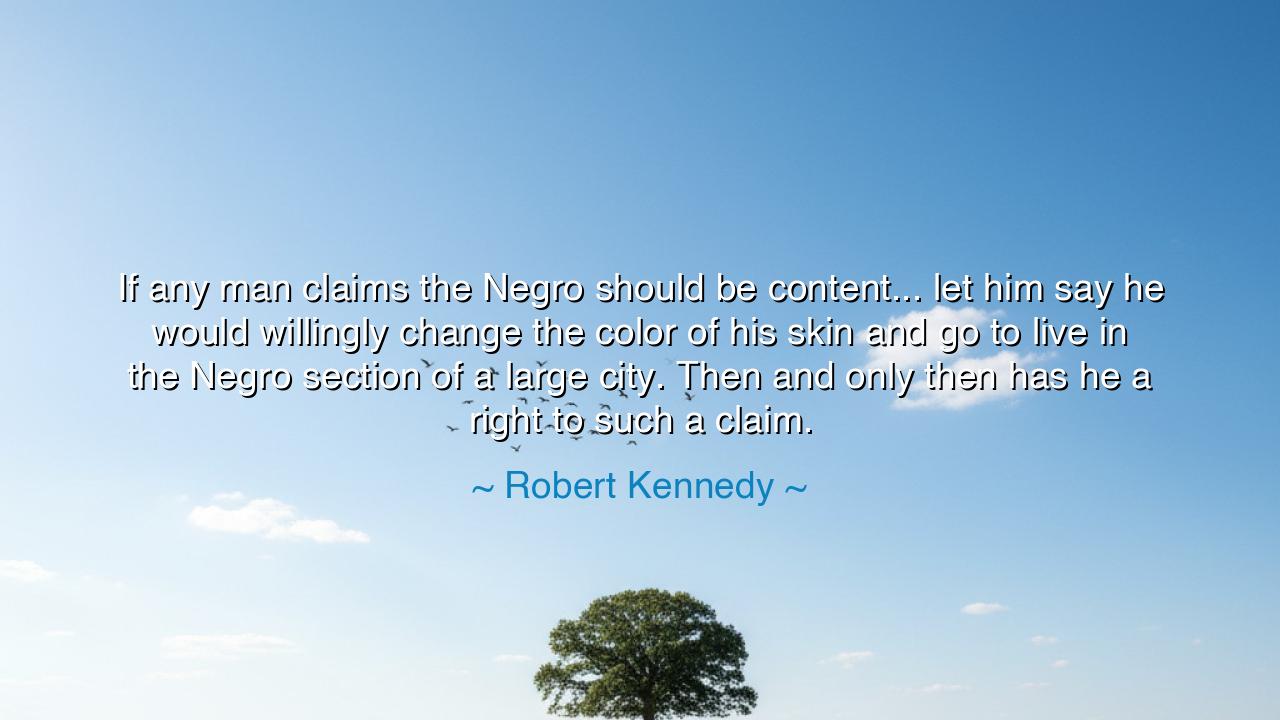
If any man claims the Negro should be content... let him say he
If any man claims the Negro should be content... let him say he would willingly change the color of his skin and go to live in the Negro section of a large city. Then and only then has he a right to such a claim.






“If any man claims the Negro should be content... let him say he would willingly change the color of his skin and go to live in the Negro section of a large city. Then and only then has he a right to such a claim.” So spoke Robert F. Kennedy, a man of conscience in a time of turbulence, whose voice rose like a flame against the shadow of injustice. In these words, he summoned forth not just sympathy, but empathy—the sacred art of seeing through another’s eyes, of feeling another’s chains as one’s own. He demanded of his nation not pity for the oppressed, but honesty from the privileged. For to understand suffering, one must first be willing to bear it.
In this saying, Kennedy unmasked the hollow comfort of those who spoke of contentment while living untouched by oppression. His challenge pierced through complacency: “Would you,” he asked, “exchange your own life for theirs?” To be born Black in the America of his time was to dwell in a land of promise and yet walk forever in its shadow—to work, to strive, to dream, yet be told that one’s color was a barrier no virtue could break. Kennedy’s words were not a condemnation alone; they were a mirror held before the nation’s conscience. And the reflection it revealed was hard to bear.
In the spirit of the ancients, let us speak plainly: justice cannot live where understanding is absent, and understanding cannot live where the heart refuses to imagine. The powerful may speak easily of patience to the powerless, for they do not feel the weight of waiting. The comfortable may counsel endurance to the afflicted, for they do not feel the lash of deprivation. Kennedy’s call, then, was not only political—it was deeply moral. He called men and women to descend from the high walls of privilege and walk the streets where hope wrestles daily with despair. Only there, he said, could they truly speak of what it means to be content.
Consider the story of James Meredith, the first African American to enroll at the University of Mississippi in 1962. His mere presence on that campus sparked riots, hatred, and bloodshed. Federal troops were sent to protect him, yet stones and curses rained upon him as if knowledge itself were a sin for one of his race. Meredith’s courage revealed the bitter truth Kennedy spoke of: that to live as a Black man in America was to live in defiance of systems built to deny one’s humanity. Could any man, Kennedy asked implicitly, look upon such struggle and still say, “He should be content”? Only he who would trade his own skin for that burden could speak those words with integrity.
In the ancient days, philosophers taught that virtue begins in self-knowledge. Kennedy extended that truth to his age: virtue in society begins with self-reflection. A man who refuses to look inward, who does not question the ease of his own life while others suffer, cannot be righteous. For he has mistaken luck for merit, comfort for peace, and silence for order. The man who would see justice flourish must first confront his own heart and ask, “What would I endure if I were in their place?” Without this question, all talk of harmony is a lie.
There is a fire within Kennedy’s words—a fire not of destruction but of illumination. He reminds us that equality is not born from speeches, nor peace from the absence of struggle. They are born from courage, from the willingness to walk beside those whom society has cast aside. To change one’s skin, even in imagination, is to awaken to the truth that no race, no color, no creed deserves less dignity than another. When we begin to feel another’s pain as if it were our own, the walls that divide us begin to crumble.
The lesson, then, is this: empathy is the root of justice. Let no man judge another’s discontent until he has stood in that man’s place. Let no woman dismiss another’s cry until she has felt the sting that gave it birth. In our own lives, we must practice the courage of imagination—to see the world as others live it, to listen before we speak, to stand where it is hardest to stand. Go, therefore, into the streets, into the schools, into the hearts of those whose voices have been silenced, and ask—not “Why do you cry?” but “How may I help you heal?”
Thus, future generations, remember the wisdom of Robert Kennedy. His words are not of the past; they are a torch for every age that wrestles with injustice. Do not be content with comfort while others dwell in pain. For the measure of a just soul, and of a just society, lies in this: the willingness to trade one’s own peace for the sake of another’s dignity. Only then, and only then, will we have earned the right to speak of contentment.






AAdministratorAdministrator
Welcome, honored guests. Please leave a comment, we will respond soon